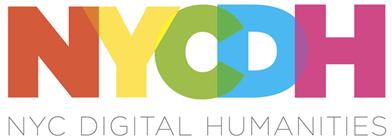Hi all,
The newly started Futures Initiative at The Graduate Center, together with Duke University’s PhD Lab, HASTAC@CUNY and HASTAC@Duke, NY2020, as well as a growing list of distance partners, are hosting an event THIS FRIDAY, OCTOBER 10TH BETWEEN 4PM AND 5.30PM, which might be interesting for some of you: “What Is a Dissertation? New Models, New Methods, New Media.” Recent and current doctoral students will illustrate innovative and experimental approaches to the dissertation format. You are welcome to attend the event virtually (livestreamed at http://bit.ly/FuturesED-live), or in person: English Department Lounge (Room 4406), The Graduate Center, CUNY, 365 Fifth Avenue, NY NY 10016. You can read more about the event here: http://www.hastac.org/blogs/cathy-davidson/2014/08/28/what-dissertation-new-models-methods-media.
An hour before the event, the online journal Hybrid Pedagogy will host their #digped chat on Twitter, beginning at 3:00pm EST on October 10, with the goal: “to turn the dissertation (and scholarship more broadly) on its head — to discover and uncover what is and is not pedagogical in the form — to imagine and inspire new shapes for academic work.”
You can read more about this week’s #digped chat, and the questions that Jesse Stommel, Director of Hybrid Pedagogy, has posted in advance of the chat here: http://www.hybridpedagogy.com/page-two/dissertations-theses-pedagogical-monstrosities-digped-discussion.
For those of you who are interested in reading the questions, I have posted them here:
- How is the dissertation pedagogical? What are the intrinsic and instrumental values of the form?
- What shapes can (or should) a dissertation take? What institutional structures must change in order to make way for a proliferation of unique forms? How can we collectively manage anxieties about the dissertation that often get in the way of the kind of experimentation that pedagogy demands?
- How is technology changing the shape of dissertations? Increasingly, dissertations are published openly on the web (sometimes even during their completion). Are all dissertations, to some extent, digital? Or is the digital dissertation its own unique form?
- What intersections do we see between PhD dissertations, creative MFA theses, and the products of non-traditional students? When and how do graduate students enter the scholarly conversation in their disciplines?
- How can we make way for more collaborative dissertations, especially in fields where dissertation-writing is traditionally a very isolated endeavor? What are the benefits of making this work increasingly collaborative?
(From http://www.hybridpedagogy.com/page-two/dissertations-theses-pedagogical-monstrosities-digped-discussion/)
I hope to see you on Friday, virtually or in person at The Graduate Center, CUNY!
Attachments:
You must be
logged in to view attached files.
